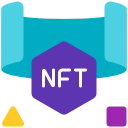Web3 Game Development
Web3 Game Development revolutionizes the gaming industry by integrating blockchain technology, decentralized systems, and true digital asset ownership. Unlike traditional games where players have limited control over in-game items, Web3 games enable players to fully own, trade, and monetize digital assets through NFTs, tokenized economies, and blockchain-secured gameplay. This creates transparent, trustless environments where every in-game action and transaction is recorded immutably on the blockchain. With decentralized architecture, Web3 games offer enhanced security, verifiable fairness, and interoperable digital ecosystems where assets can move across multiple platforms and experiences. Smart contracts automate game mechanics, rewards, and marketplace interactions, ensuring fairness and eliminating the need for centralized control. By merging advanced blockchain technology with engaging game design, Web3 Game Development opens the door to play-to-earn models, community-driven economies, and next-generation gaming experiences that empower both developers and players.


Innovative Blockchain Gaming Platforms
Innovative Blockchain Gaming Platforms are redefining the future of digital entertainment by merging advanced blockchain technology with engaging, player-centric game experiences. These platforms empower gamers with true ownership of in-game assets through NFTs and tokenized economies, enabling players to buy, sell, trade, and monetize items across decentralized marketplaces. By leveraging the transparency and immutability of blockchain, these gaming ecosystems ensure fair gameplay, verifiable transactions, and secure asset management without dependence on centralized servers. With smart contract automation, blockchain gaming platforms streamline reward systems, in-game economies, and player interactions—creating sustainable and scalable play-to-earn environments. Developers gain the ability to build interoperable game worlds where digital assets can be used across multiple titles and experiences.
Enterprise Web3 Gaming Ecosystems – Secure, Transparent & Scalable
Enterprise Web3 Gaming Ecosystems empower organizations to build secure, transparent, and decentralized gaming environments tailored for large-scale operations. These systems leverage blockchain technology to ensure tamper-proof gameplay, verifiable transactions, and true digital asset ownership. Smart contracts automate game logic, reward distribution, and marketplace interactions with complete transparency.
Designed for scalability, they support high user volumes, complex economies, and cross-platform interoperability. Enterprises gain a future-ready gaming infrastructure that enhances trust, performance, and long-term innovation.

Enterprise Web3 Gaming
Empowering enterprises with decentralized, transparent, and scalable gaming ecosystems. Built using blockchain and smart contracts for asset management and automated gameplay.

Secure Web3 Game Systems
Designed to deliver tamper-proof gameplay and trusted player interactions. Blockchain-backed security ensures verifiable transactions and protected digital assets.

Scalable Blockchain Gaming
Engineered for high-performance gaming environments with large user bases. Supports complex game economies and cross-platform interoperability.

Trustless Gaming Solutions
Enables fair, automated, and transparent gameplay without centralized control. Smart contracts ensure rule enforcement and eliminate manipulation.

Future-Ready Web3 Games
Developed with next-generation blockchain technology for long-term growth. Offers sustainable tokenized economies and enhanced player engagement.

Decentralized Game Platforms
Creates open gaming ecosystems where players fully own and trade digital assets. Designed to support play-to-earn models and community-driven experiences.
Transforming Games with Blockchain Innovation
Blockchain innovation is revolutionizing the gaming industry by enabling secure, transparent, and player-owned digital ecosystems. By integrating decentralized technology, games can offer verifiable fairness, automated mechanics, and tamper-proof asset management. Players gain true ownership of in-game assets through NFTs and tokenized economies. Smart contracts streamline rewards, trades, and interactions without relying on centralized control. This transformation empowers developers to create immersive, sustainable, and future-ready gaming experiences.

Secure & Scalable Web3 Game Architecture
Secure & Scalable Web3 Game Architecture provides the foundation for building next-generation gaming experiences powered by blockchain technology. This architecture ensures that every aspect of gameplay from asset ownership to transaction processing is fully protected through cryptographic security and decentralized infrastructure. By eliminating single points of failure and leveraging trustless validation, Web3-based game systems deliver unmatched transparency and tamper-proof operations. Scalability is at the core of modern Web3 gaming, enabling platforms to support millions of players, complex token economies, and high-frequency interactions without performance degradation. With Layer-2 solutions, sidechains, and optimized consensus mechanisms, Web3 game architectures achieve low fees, fast processing, and seamless interoperability across networks. Smart contracts automate game logic, reward mechanisms, and marketplace transactions, ensuring fairness and removing dependence on centralized servers.
FAQ
What is Web3 Game Development and how does it differ from traditional game development?
Web3 Game Development involves creating decentralized games that run on blockchain networks, giving players true ownership of in-game assets. Unlike traditional games where assets are stored on centralized servers, Web3 games use smart contracts and decentralized storage. This ensures transparency, fairness, and tamper-proof gameplay. Players can trade or monetize assets freely, without restrictions from game publishers.
How do blockchain and NFTs enhance player ownership in Web3 games?
Blockchain provides a transparent, immutable record of ownership for every digital asset in the game. NFTs represent unique in-game items that players fully control, independent of the game’s servers. Players can buy, sell, or trade NFTs across marketplaces without losing ownership. This establishes a real value economy where items have utility both inside and outside the game.
What role do smart contracts play in automating game mechanics?
Smart contracts automate processes such as rewards, battles, trades, and in-game interactions. They execute rules instantly and transparently without human oversight. Because the logic is stored on the blockchain, it cannot be altered or tampered with. This ensures fairness, consistency, and trust among all players.
Are Web3 games more secure than traditional online games?
Yes, Web3 games offer enhanced security due to decentralization and cryptographic protection. Blockchain eliminates single points of failure, reducing risks of hacking or data loss. Smart contracts ensure transparent and verifiable interactions. This creates a safer environment for both gameplay and asset storage.
Can Web3 games integrate with existing gaming engines like Unity or Unreal Engine?
Yes, Web3 games can be built using leading engines such as Unity and Unreal Engine. Developers can integrate blockchain features using SDKs, APIs, and Web3 libraries. This approach allows rich graphics and gameplay combined with decentralized functionality. It enables modern gaming experiences without sacrificing blockchain benefits.
What are the benefits of play-to-earn (P2E) models in Web3 gaming?
P2E models reward players with tokens or NFTs for participating in the game. Players can earn real-world value through gameplay, achievements, or contributions. This creates a sustainable economy where users become active participants, not just consumers. P2E enhances player engagement, longevity, and community involvement.
How scalable are Web3 gaming platforms for large player bases and complex economies?
Modern Web3 platforms use Layer-2 solutions and sidechains to support high transaction volumes. They enable fast, low-cost interactions even during peak activity. Scalable architectures can handle large player communities and dynamic in-game economies. This ensures smooth performance as the game ecosystem grows.

